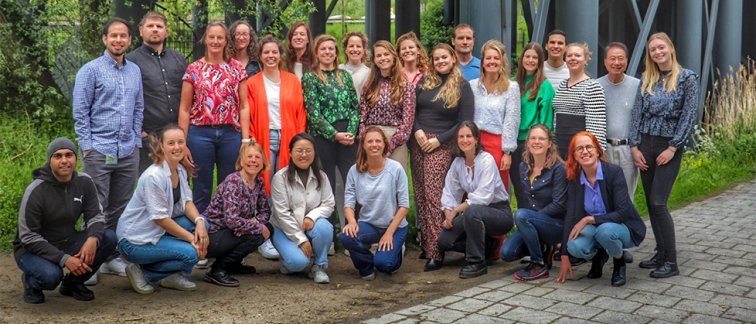Every third Friday of the month, researchers affiliated with Cancer Center Amsterdam (CCA) gather for the ‘CCAll’ lectures. During these hybrid online and in-person meetings, a selected principal investigator (PI) and research team present an overview of their scientific interests and experimental data. CCAll meetings aim to facilitate connections among CCA scientists and foster collaborations within our institute. At the most recent CCAll meeting, the human papillomavirus (HPV) and gynecological cancer research group led by Prof. Renske Steenbergen and Dr. Maaike Bleeker discussed human papillomavirus (HPV)-induced cancers and novel non-invasive methods for cancer detection.
HPV-induced cancers
HPV (human papillomavirus) is a DNA virus that is primarily transmitted through sexual contact and infects the cells of the epithelial tissues, such as the skin and mucous membranes. While most HPV infections are cleared by the immune system, some persistent infections with high-risk types of HPV can increase the risk of developing various types of cancer, including cervical, anal and vulvar cancer.
Cells infected with HPV can accumulate molecular alterations that drive the development of high-grade precancer lesions and cancer. This process is the focus of the human papillomavirus (HPV) and gynecological cancer research group.
The group aims to:
- Improve the effectiveness of cervical and anal cancer screening programs.
- Enable personalized treatment of HPV-induced premalignant anogenital disease.
- Improve prevention, early detection. diagnostics, and risk stratification of anogenital and gynecological (pre)cancers.
To achieve these goals, a highly interdisciplinary research team of molecular biologists, clinicians, and biostatisticians has been established.
Translational pipeline for biomarker discovery
“Our research utilizes an important translational pipeline involving the discovery of genetic and epigenetic mechanisms driving HPV-induced carcinogenesis. With this pipeline, we can identify potential disease biomarkers that can be used to detect, diagnose, or monitor the progression of anogenital disease.
“Towards these goals, we analyze specimens from patients with anogenital (pre)malignant disease (e.g. cervix, vulva and anus) using genome-wide screens and candidate gene approaches to identify relevant cellular alterations.
“Using in vitro studies on HPV-transformed human keratinocytes, we have demonstrated that progression of a high-risk HPV-infected cell to a malignant phenotype results from the accumulation of specific (epi)genetic alterations in the host cell genome. Functional data from these model systems are used to complement studies with clinical samples to select the most promising biomarkers for risk stratification of premalignant disease. Candidate biomarkers are then clinically validated using well-defined retrospective and prospective clinical collections consisting of tissues, cervical scrapes, self-collected cervicovaginal samples and urine.”
Novel non-invasive ‘cancer fingerprint’ detection
The recent success of cervical cancer detection in urine imposed a further extension of their research towards the value of urine as a liquid biopsy to detect anogenital cancers.
In many cancers, including HPV-induced diseases, aberrant DNA methylation patterns are common. Molecular tests based primarily on detecting these fingerprints of cancer are being developed to enable (early) detection of cancer from a sample of urine. This line of research is conducted in close collaboration with the Center of Gynecological Oncology Amsterdam and the departments of Urology, Pulmonology and Surgery at Amsterdam UMC. The University of Twente is also collaborating in adapting our PCR-based detection into a lab-on-a-chip point-of-care test.
For more information, contact Prof. Renske Steenbergen.
Team members at Cancer Center Amsterdam:
Maaike Bleeker
Irene Beijert
Timo ter Braak
Birgit Wever
Yara van den Burgt
Fernando Dias Goncalves Lima
Stèfanie Dick
Sylvia Duin
Kahren van Eer
Danielle Heideman
Angelina Huseinovic
Annelieke Jaspers
Mariano Molina Beita
Kirsten Rozemeijer
Flavia Runello
Mirte Schaafsma
Nikki Thuijs
Lisanne Verhoef
Dominique de Vries
Féline Voss
Mengfei Xu
Thomas Zheng
Renske Steenbergen
Website
Text by Prof. Renske Steenbergen.
The next CCAll meeting is scheduled for Friday June 16 and will feature research from the team of Jeroen Guikema.
This article was created for Cancer Center Amsterdam.

